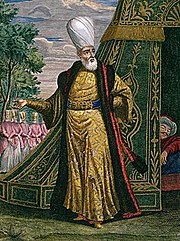
A Janissary Agha

Crimean Agha Dedesh, painted in 1664 for king John II Casimir by Daniel Schultz

Omar Agha, officer for the Kurdish Pasha, Sheikh Mahmoud of Sulaymaniyah of Baban principality, Kurdistan, 1820[1]
Agha, also Aga (from Turkish: ağa "chief, master, lord",[2] Persian: آقا), as a title for a civilian or military officer, or often part of such title, was placed after the name of certain military functionaries in the Ottoman Empire. At the same time some court functionaries were entitled to the agha title.
Civilian titles[]
- Aga Khan is the title of the leader of the Shia Muslim Nizari Ismaili sect. The title Agha Khan was an honorific title bestowed by Fat′h Ali Shah Qajar of Iran on his son-in-law Hassan Ali Shah (ca.1800-1881), the leader of the Ismaili Shi'as of Persia.
Other uses[]
- Agha is both a title and a family name in Palestine.
- Aga is used for grandfather by Turks in the west and in Turkmenistan.
- Agha/Aga is a family name in Egypt.
- Aga is a family name in Norway.
- In Romanian, the Turkish title, spelled aga, was used for the chief of an agie, a law enforcement office.
- In Persian, agha is normally used to refer to a male superior, similar to mister.
- In Tunisia, during the Ottoman Empire, the agha was the ruler of a region (for example Gabès). The name persists as a family name.
- Aga/Agha is used as a proper name by the Moro people of the southern Philippines.
- In Manchu, Age ("阿哥" in Chinese) is an honorific used to address male royalties and nobilities. In particular, it was used to address otherwise untitled princes of the Qing imperial house.
- The title Da-Age ("大阿哥", lit. "Grand Age" or "First Age") was traditionally given to the eldest sons of the Qing emperors. In 1899, Prince Pujun, the childless Emperor's nephew from both male and female lines, was given this title, in effect naming Pujun as the heir to the throne. In this case "Da-Age" was used in place of "Taizi", or Crown Prince, to designate the heir. (Manchu traditionally did not practice primogeniture.)
- In Korean, agha or aghi refer to an infant child, or baby.
- Agha is also used as a first name in some cases, e.g., Agha Ganda or Agha Gunda.
- Aghasyan or Aghassian is used as last name in Armenia.
Agha in Kurdistan[]
In Kurdistan, within the tribal Kurdish society, "agha" is the title given to tribal chieftains, either supreme chieftains, or to village heads. It is also given to wealthy landlords and owners of major real estates in the urban Kurdish centers, although these landlords are usually with heavy tribal relations. The common tribesmen would honor the chieftains or the village heads by calling them "agha" or "agha" so and so. The "agha" would usually have a diwan or diwan-khane, a special room, or house, dedicated to the "agha" and his male guests, for sitting and drinking tea, discussing the affairs of the tribe and other mundane subjects. The agha and his guests would listen at times for local or visiting singers and story tellers (usually Jewish merchants or peddlers), who would entertain the "agha" and his guests. The common agha was in fact one person who was in charge of several major tasks of the tribal society under his jurisdiction: He was the head of the political unit, the main judge and arbitrator, the main military leader of his armed tribesmen, the main finance minister responsible mainly for receiving dues from his subjects for their harvest and commercial transactions committed under his jurisdiction. One of the best studies on "aghas" in the Kurdish society is the important book of Mordechai Zaken, Jewish Subjects and their tribal chieftains in Kurdistan.[3]
Etymology[]
The word agha entered English from Turkish,[2] and the Turkish word comes from the Old Turkic aqa, meaning "elder brother".[4] Ultimately the Old Turkic word, along with the Mongolian word aga, has its origins in the proto-Altaic word "ák'v".[citation needed]
See also[]
| Look up agha in Wiktionary, the free dictionary. |
| Wikisource has the text of the 1911 Encyclopædia Britannica article Aga. |
- State organisation of the Ottoman Empire
- Agaluk
Notes[]
- ↑ Narrative of Residence in Koordistan and on the Site of Ancient Nineveh, pages 66 and 214, Claudius James Rich, Published 1836, J. Duncan, 860 pages
- ↑ 2.0 2.1 Online Etymology Dictionary - Aga
- ↑ Mordechai Zaken, Jewish Subjects and their tribal chieftains in KurdistanL A Study in Survival, Leiden and Boston, Brill, 2007. For a review of this book see the following review in Amazon: http://www.amazon.com/Subjects-Chieftains-Kurdistan-Identities-Changing/product-reviews/9004161902/ref=dp_top_cm_cr_acr_txt?ie=UTF8&showViewpoints=1
- ↑ Dictionary.com Unabridged - aga
References[]
- AllAboutTurkey.com
- RoyalArk - see each present country
- Ottoman empire site- original full version in German (not yet exploited)
The original article can be found at Agha (Ottoman Empire) and the edit history here.